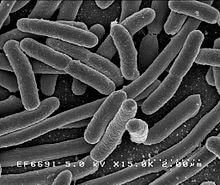Researchers have demonstrated that an altered gut microbiota in humans is associated with symptomatic atherosclerosis and stroke.
These findings, from at the University of Gothenburg, Sweden, and the Chalmers University of Technology, Sweden, are presented in a study published in Nature Communications on December 4. The human body contains ten times more bacterial cells than human cells, most of which are found in the gut. These bacteria contain an enormous number of genes in addition to our host genome, and are collectively known as the gut metagenome.
 How does the metagenome affect our health? This question is currently being addressed by researchers in the rapidly expanding field of metagenomic research. Several diseases have been linked to variations in the metagenome.
How does the metagenome affect our health? This question is currently being addressed by researchers in the rapidly expanding field of metagenomic research. Several diseases have been linked to variations in the metagenome.
Researchers at Chalmers University of Technology and Sahlgrenska Academy, University of Gothenburg, now also show that changes in the gut metagenome can be linked to atherosclerosis and stroke.
The researchers compared a group of stroke patients with a group of healthy subjects and found major differences in their gut microbiota. In particular, they showed that genes required for the production of carotenoids were more frequently found in gut microbiota from healthy subjects. The healthy subjects also had significantly higher levels of a certain carotenoid in the blood than the stroke survivors.
Carotenoids are a type of antioxidant, and it has been claimed for many years that they protect against angina and stroke. Thus, the increased incidence of carotenoid-producing bacteria in the gut of healthy subjects may offer clues to explain how the gut metagenome affects disease states.
Carotenoids are marketed today as a dietary supplement. The market for them is huge, but clinical studies of their efficacy in protecting against angina and stroke have produced varying results.
Jens Nielsen, Professor of Systems Biology at Chalmers, says that it may be preferable to take probiotics instead – for example dietary supplements containing types of bacteria that produce carotenoids.
“Our results indicate that long-term exposure to carotenoids, through production by the bacteria in the digestive system, has important health benefits. These results should make it possible to develop new probiotics. We think that the bacterial species in the probiotics would establish themselves as a permanent culture in the gut and have a long-term effect”.
“By examining the patient’s bacterial microbiota, we should also be able to develop risk prognoses for cardiovascular disease”, says Fredrik Bäckhed, Professor of Molecular Medicine at the University of Gothenburg. “It should be possible to provide completely new disease-prevention options”.
The researchers have now started a company, Metabogen, to further develop their discoveries relating to the metagenome. Their success is based on close cooperation between engineers, microbiologists and doctors.
Jens Nielsen and Fredrik Bäckhed both agree that one of the challenges in the rapidly developing area of metagenomics is its multidisciplinary facets, requiring novel collaborations and merging of research fields.
The paper “Symptomatic atherosclerosis is associated with an altered gut metagenome” was published on December 4.


The iron rich diet , meat and iron fortified food , causes a high iron environment in the gut which allows for pathogenic bacteria to outperform the probiotic strains such as lactobacillus.
“Researchers isolate iron as probiotic blocker”
“Probiotic strains underperform in the presence of iron-rich environments”
The problem may lie in our high iron diets. We add the metal iron to all our foods. It has been shown pathogenic bacteria outperform bacteria such as lactobacillus, which do not require iron. When a person eats a high iron diet pathogenic bacteria flourish , then the good bacteria lose and the pathogenic bacteria such as e. coli will take over.
“Certain probiotic strains underperform in the presence of iron-rich environments ”
Which is why most of the world is lactose intolerant , no lactobacillus bacteria , DUE TO the high iron diet which causes the lactobacillus to lose out to the pathogenic bacteria which do not produce carotenoids.